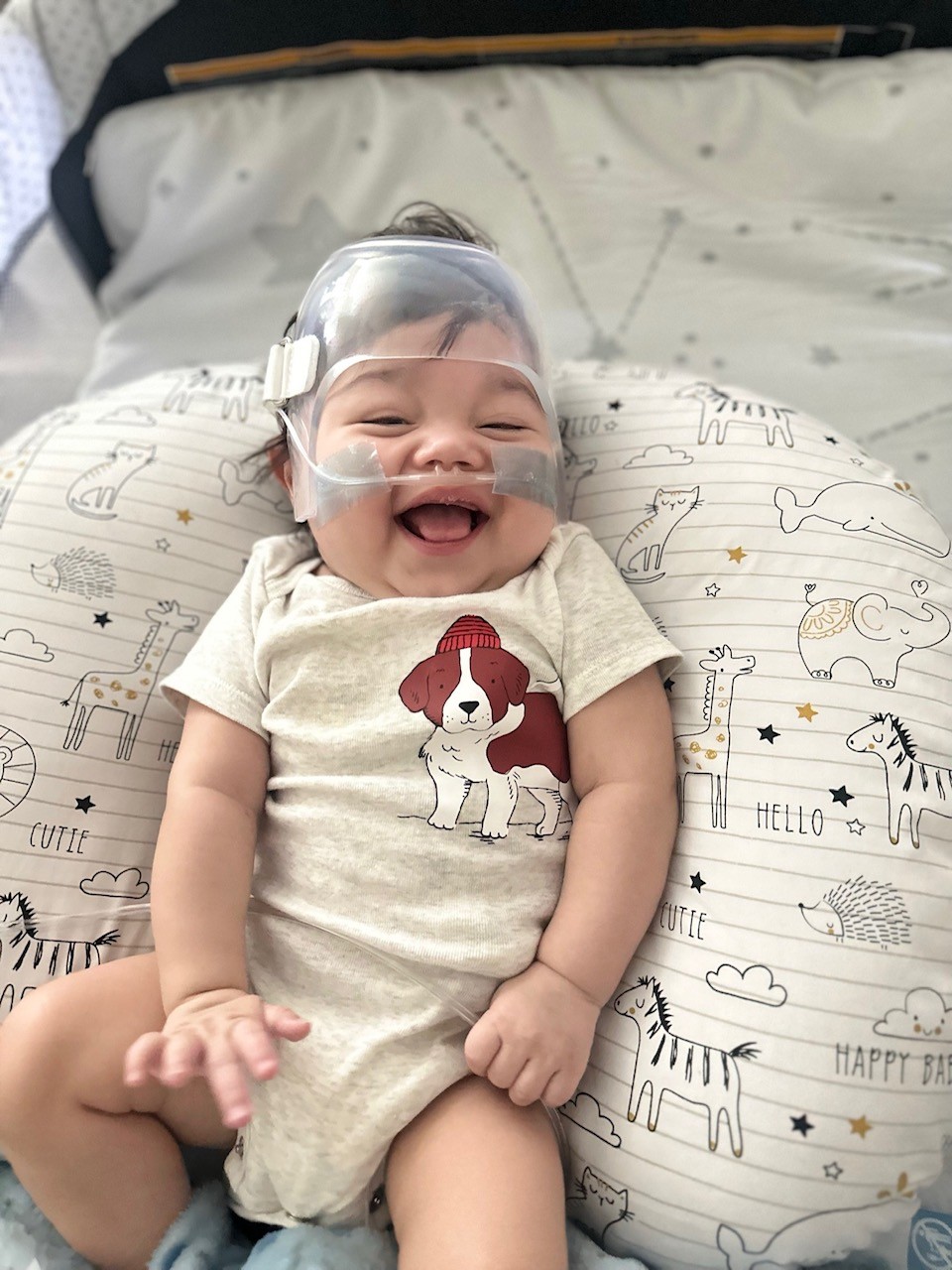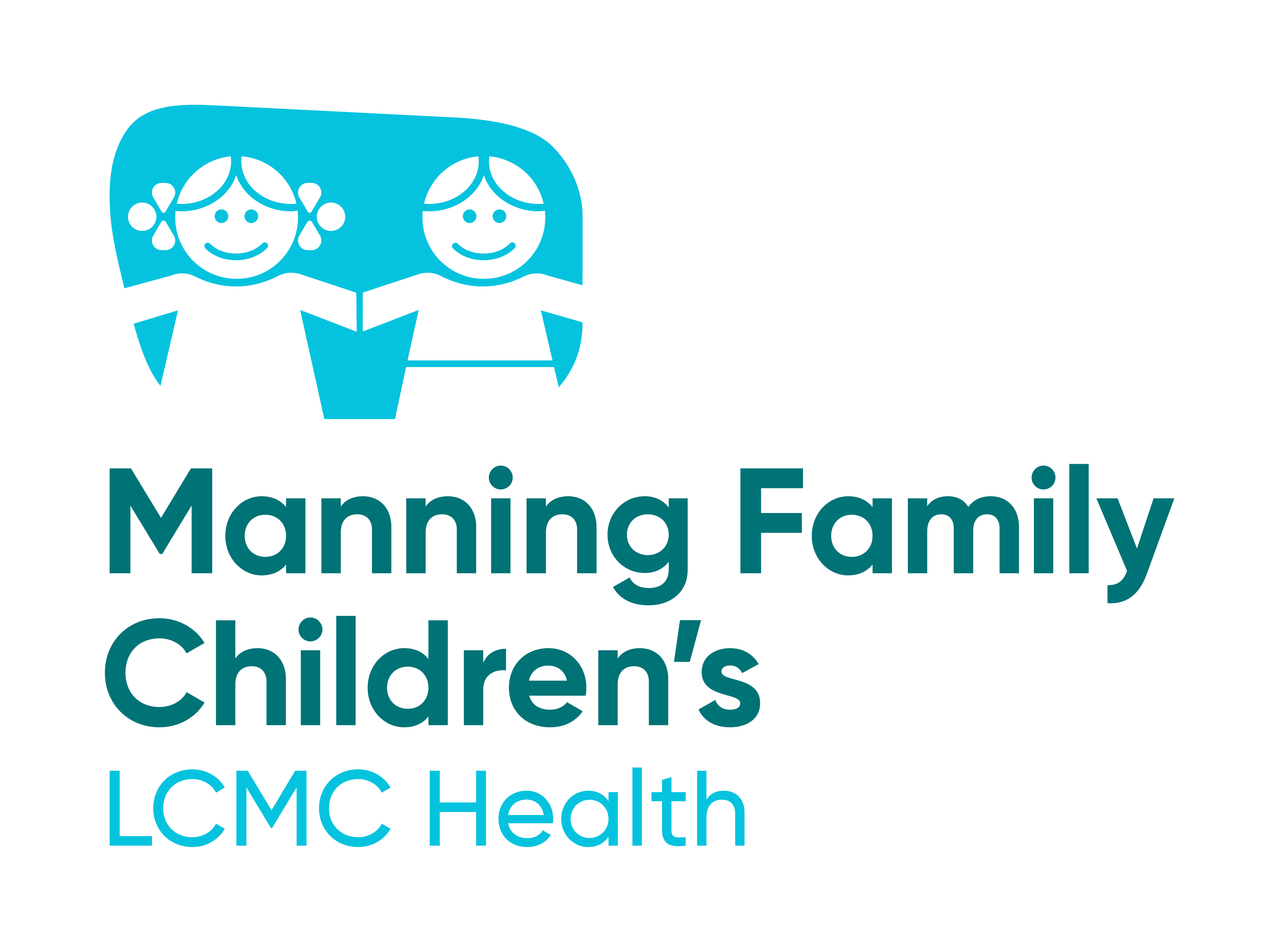Baby Abraham Thrives with the Help of "Angels" at Manning Family Children’s
- Category: Cardiology, Patient Stories
- Posted on:

At eight weeks into her pregnancy, 26-year-old Katherine Merino went in for her first ultrasound appointment. She and her husband, Gerber, 29, had been trying to conceive for a long time and had even endured a miscarriage along the way.
But now that they were about to see their baby on screen, those feelings of longing faded into the past. The couple was focused on their future together as a family.
Unfortunately, excitement turned to fear when the ultrasound didn’t go as they hoped. The scan showed their baby boy had a congenital diaphragmatic hernia (CDH) – an abnormal opening in the baby’s diaphragm. The condition, which requires surgery after birth, must be watched closely in utero because the abnormal opening often permits parts of some abdominal organs to move into the chest cavity close to the lungs. This movement of organs may impact the baby’s ability to breathe once he is born.
 One Step at a Time
One Step at a Time
Katherine began undergoing weekly ultrasound scans locally, in their hometown of Westwego, La., to monitor the baby’s heart and lungs. The Merinos also began seeing doctors at Manning Family Children's during the pregnancy because they knew they wanted to have Abraham’s hernia operation there.
When Abraham Benjamin Merino was born on Dec. 20, 2023 – at 38 weeks – he was immediately taken to Children’s Hospital New Orleans. He was in distress; the baby’s stomach was pushing against his heart and he was suffering from severe pulmonary hypertension.
The medical team at the Neonatal Intensive Care Unit did everything possible to control Abraham’s pulmonary hypertension. However, in early January, doctors explained the dire situation to Katherine and Gerber.
“We were told our baby needed life support treatment. His heart and lungs were not able to function well enough to keep Abraham alive,” Katherine said.
Extracorporeal membrane oxygenation (ECMO) temporarily takes over the function of the heart and lungs when traditional, less aggressive treatments are not successful.
Katherine remembers nurse Sarah Finken. “When Abraham was in the NICU being observed, Sarah kept checking on him and tending to him. When we were told he was going to have to be put on ECMO, we were so scared,” Katherine recalled. “But Sarah didn’t leave Abraham’s side. She was with us the entire time. I can’t thank her enough for how she cared for my family.”
Abraham was put on ECMO on Jan. 4, 2024.
“I was so scared of that machine,” Katherine said. “They explained to us that there was a chance that the baby would not come off of the machine. They told us he could die, but Adele P. Williams, MD, a pediatric surgeon, told us they could do the hernia repair while he was on ECMO. We decided we had no choice but to take one thing at a time.”
Dr. Williams clarified the decision, saying, "I only offered to perform the surgery on ECMO because Abraham was not improving. Surgery on ECMO always carries a very high risk of bleeding, so we only consider it when there are no other viable alternatives. The bleeding and subsequent complications that followed were known risks, but proceeding with the surgery was essential."
Abraham underwent successful surgery to repair the congenital diaphragmatic hernia on Jan 12, 2024.
“Dr. Williams is a fantastic surgeon,” said Katherine. “She has been so good with Abraham since he was born. She was great at explaining the surgeries to us and told us exactly how everything was going to go. All of the doctors and nurses at Children’s were like angels to our family.”
 When Worse Comes to Worst
When Worse Comes to Worst
Unfortunately, despite how successful the hernia repair went, the baby was not out of the woods.
“While on ECMO, Abraham’s liver and kidneys stopped working,” said Katherine. “He was connected to dialysis. He had many blood transfusions while on ECMO.”
One of the main challenges was that doctors were unable to control the baby’s bleeding. On Jan. 18, only a few days after the hernia surgery, Abraham was taken off ECMO because of the severe uncontrolled bleeding.
“We left the hospital to get a change of clothes at home. We were gone for only a little while,” Katherine said. “But then I got a phone call.”
It was the most difficult conversation of her life to date. The NICU team told her she had to come back to the hospital right away and stay close.
“They said they weren’t sure he was going to make it,” Katherine said. “I felt like the whole world came down on me. We rushed back to the hospital.”
A Turn for the Better
Once Abraham was taken off of ECMO, his bleeding reduced. The condition and function of his lungs and heart started to improve as well.
A month later, Katherine said she was finally able to hold her baby. “I was so happy. It was the best day of my life.”
Katherine said that without the love and care of the NICU nurses, she and her family wouldn’t have made it. “We had the very best team I could imagine. The entire NICU staff – those people have been so amazing. They were always checking on me and my husband. They were so protective over Abraham. They really made such a difference to our family.”
Katherine and Gerber also wanted to recognize Abraham’s primary nurse Mary Marrero, whom they lovingly refer to as “Tia Mary.”
“We want to say a big, big ‘Thank You’ to her,” Katherine said. “We are very grateful for her kindness and exceptional care. Her love for her patients is truly commendable. She took care of Abraham as she would her own child.”
Life Goes On
The Merinos left Manning Family Children’s on July 20, when little Abraham was 7 months old. Though he left the hospital on oxygen and with a g-tube for feeding, all signs point to Abraham being able to breathe and eat on his own soon.
Abraham is being closely watched monthly by Children’s Hospital pulmonologist Leah Nuss, MD. She takes delight along with Katherine and Gerber when Abraham smiles and makes noises.
“He is holding his head up and sitting up. He is grabbing at toys and putting everything in his mouth,” Katherine reported. “Abraham is such a happy baby.”
As for his future, the Merinos want what every mom and dad want. “We hope he gets completely better and has a normal, healthy life,” Katherine said. “And, maybe, if we are all lucky, Abraham will be a big brother some day!”
 To learn more about Manning Family Children’s respiratory and pulmonology program, visit:
To learn more about Manning Family Children’s respiratory and pulmonology program, visit:
https://www.manningchildrens.org/services/pulmonology/ For details on their pediatric surgical department, visit: https://www.manningchildrens.org/services/pediatric-surgery/
For more information on the Neonatal Intensive Care Unit, visit:
https://www.manningchildrens.org/services/critical-care/neonatal-intensive-care/



